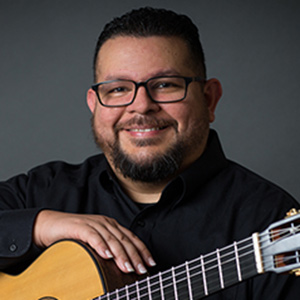SONGS OF LOVE
Saturday, June 4, 2022 | 7:30 PM
Presidio La Bahía, Goliad
FEDERICO GARCÍA LORCA (1898-1936)
Selections from Canciones Españolas Antiguas
- Anda Jaleo
- Morillas de Jaén
- Café De Chinitas
- Nana de Sevilla
- Sevillanas del Siglo XVIII
Laura Mercado-Wright, mezzo-soprano
Isaac Bustos, guitar
PAUL MCCARTNEY (b. 1942)
Yesterday (Arr. Takemitsu)
Isaac Bustos, guitar
QUIRINO MENDOZA Y CORTÉS (1859-1910)
Cielito Lindo
FERNANDO CARLOS TAVOLARO (b. 1953)
Milonga No. 5 (Dell’Emigrante)
ARIEL RAMIREZ (1921-2010)
Alfonsina y el Mar
Laura Mercado-Wright, mezzo-soprano
Isaac Bustos, guitar
JOSE LUIS MERLÍN (b. 1952)
Joropo
Isaac Bustos, guitar
MANUEL DE FALLA (1876-1946)
Siete Canciones Populares Españolas
- El Paño Moruno
- Seguidilla Murciana
- Asturiana
- Jota
- Nana
- Canción
- Polo
Laura Mercado-Wright, mezzo-soprano
Isaac Bustos, guitar

Sponsors
Ron Walker
Albert E. & Myrtle Gunn York Trust
This concert is generously supported by our concert sponsors and by donors to the Victoria Bach Festival’s Annual Fund. Many thanks to our generous supporters!
Anda jaleo
Yo me alivié a un pino verde
por ver si la divisaba,
y sólo divisé el polvo
del coche que la llevaba.
Anda jaleo, jaleo:
ya se acabó el alboroto
y vamos al tiroteo.
No salgas, paloma, al campo,
mira que soy cazador,
y si te tiro y te mato
para mí será el dolor,
para mí será el quebranto,
Anda, jaleo, jaleo:
ya se acabó el alboroto
y vamos al tiroteo.
En la calle de los Muros
han matado una paloma.
Yo cortaré con mis manos
las flores de su corona.
Anda jaleo, jaleo:
ya se acabó el alboroto
y vamos al tiroteo.
Come on, riot
I approached a green pine tree
to see if I could see her,
and saw only the dust
of the car that carried her.
Come on, riot, riot:
protesting is over
and we’re headed into the firefight.
Don’t go to the field, dove,
see that I am a hunter
and if I shoot and kill you
it will be painful for me,
it will be a great loss.
Come on, riot, riot:
protesting is over
and we’re headed into the firefight.
In the Street of the Ramparts
someone has killed a dove.
With my own hands, I will cut
the flowers for her burial crown.
Come on, riot, riot:
protesting is over
and we’re headed into the firefight.
Las morillas de Jaén
Tres morillas m’enamoran
en Jaén:
Axa y Fátima y Marién.
Tres morillas tan garridas
iban a coger olivas,
y hallábanlas cogidas
en Jaén:
Axa y Fátima y Marién.
Y hallábanlas cogidas
y tornaban desvaídas
y las colores perdidas
en Jaén:
Axa y Fátima y Marién.
Tres morillas m’enamoran
en Jaén:
Axa y Fátima y Marién.
Tres morillas tan lozanas,
Tres morillas tan lozanas,
iban a coger manzanas
en Jaén:
Axa y Fátima y Marién.
Díjeles: ¿Quién sois, señoras,
de mi vida robadoras?
Cristianas que éramos moras
en Jaén:
Axa y Fátima y Marién.
The Moorish girls from Jaén
Three Moorish girls made me fall in love
in Jaén:
Aicha, Fatima and Marien.
Three fine-looking Moorish girls
went out to pick olives
and found them all picked
in Jaén:
Aicha, Fatima and Marien.
They found them all picked,
and they came back pale,
drained of color
in Jaén:
Aicha, Fatima and Marien.
Three Moorish girls made me fall in love
in Jaén:
Aicha, Fatima and Marien.
Three excitable Moorish girls,
Three very excitable Moorish girls,
went to pick apples
in Jaén:
Axa, Fatima and Marien.
I said to them, “Who are you, ladies,
thieves of my life?”
“We are Christians who were once Moors
in Jaén:
Aicha, Fatima and Marien.”
El café de Chinitas
En el café de Chinitas
dijo Paquiro a su hermano:
”Soy más valiente que tú,
más torero y más gitano.”
En el café de Chinitas
dijo Paquiro a Frascuelo:
“Soy más valiente que tú,
más gitano y más torero.”
Sacó Paquiro el reló
y dijo de esta manera:
«Este toro ha de morir
antes de las cuatro y media».
Al dar las cuatro en la calle
se salieron del café
y era Paquiro en la calle
un torero de cartel.
In the Chinitas Café
In the Chinitas Café
Paquiro says to his brother
“I’m braver than you,
a better bullfighter and better gypsy.”
In the Chinitas café
Paquiro says to Frascuelo
“I’m braver than you,
a better gypsy and better bullfighter.”
Paquiro pulled out his watch
and put it this way:
“This bull has to die
before four-thirty.”
When the street clock read four,
they left the café
and there was Paquiro in the street
like a bullfighter from a poster.
Nana de Sevilla
Este galapaguito no tiene mare
No tiene mare, sí
No tiene mare, no
Lo parió una gitana, lo echó a la calle
Lo echó a la calle, sí
Lo echó a la calle, no
Este niño chiquito no tiene cuna
No tiene cuna, sí
o tiene cuna, no
Su padre es carpintero y le hará una
Y le hará una, sí
Y le hará una, no
Sevillian lullaby
This little tortoise has no mother
He has no mother, sí
He has no mother, no
A gypsy woman birthed him, she threw him in the street
She threw him in the street, sí
She threw him in the street, no
This little boy has no cradle
He has no cradle, sí
He has no cradle, no
His father is a carpenter and he will make him one
He’ll make him one, sí
He’ll make him one, no
o
Sevillanas del siglo XVIII
Viva Sevilla! Viva Sevilla!
Viva Sevilla! Lllevan las sevillanas
En la mantilla un letrero que dice: Viva Sevilla!
Viva Triana, vivan los trianeros, los de Triana!
Vivan los sevillanos y sevillanas!
Lo traigo andao, lo traigo andao.
Lo traigo andao, la macarena y todo, lo traigo andao.
Lo traigo andao: cara como la tuya, no la he encontrao,
La macarena y todo, lo traigo andao.
Que bien pareces!
Ay rio de Sevilla,
Que bien pareces! Ay rio de Sevilla, que bien pareces!
Llieno de velas blancas y ramas verdes,
Ay rio de Sevilla, que bien pareces!
18th-century Sevillanas
Long live Seville! Long live Seville!
Long live Seville! The women of Seville wear letters on their veils
Long live Triana, long live the Trianeros, the people of the Triana neighborhood!
Long live the Sevillian men and women!
I carry the Macarena neighborhood with me
I carry the Macarena and everything with me, every step
I carry with me: but a face like yours I didn’t find
The Macarena and everything, I carry with me.
You look so good!
Oh, Seville river,
You look so good! Wow, Seville river, you look so good.
Full of white sails and green branches.
Oh, Seville river, you look so good!
Cielito lindo
De la Sierra Morena,
Cielito lindo, vienen bajando,
Un par de ojitos negros,
Cielito lindo, de contrabando.
Ay, ay, ay, ay,
Canta y no llores,
Porque cantando se alegran,
Cielito lindo, los corazones.
Pájaro que abandona,
Cielito lindo, su primer nido,
Si lo encuentra ocupado,
Cielito lindo, bien merecido.
Ese lunar que tienes,
Cielito lindo, junto a la boca,
No se lo des a nadie,
Cielito lindo, que a mí me toca.
Si tu boquita morena,
Fuera de azúcar, fuera de azúcar,
Yo me lo pasaría,
Cielito lindo, chupa que chupa.
De tu casa a la mía,
Cielito lindo, no hay más que un paso,
Antes que venga tu madre,
Cielito lindo, dame un abrazo.
Una flecha en el aire,
Cielito lindo, lanzó Cupido,
Y como fue jugando,
Cielito lindo, que a mí me ha herido.
Pretty Darling
From the Sierra Morena mountains,
pretty darling, a pair of deep brown eyes
Descend,
Pretty darling, like contraband.
Ay, ay, ay, ay,
Sing and don’t cry,
Because singing, pretty darling,
Cheers our hearts.
A bird that abandons
His first nest, pretty darling,
Then finds it occupied by another,
Pretty darling, deserves to lose it.
That beauty mark of yours
Pretty darling, near your mouth,
don’t share it with anyone
Pretty darling, it’s for me.
If your dark little mouth
were made of sugar,
I would enjoy myself, pretty darling,
lick by lick.
From your house to mine,
Pretty darling, there’s just one step.
Before your mother comes,
Pretty darling, come to my arms.
Cupid shot off an arrow,
pretty darling,
And while he was playing,
Pretty darling, I was hit.
Milonga No. 5 (Dell’Emigrante)
Devo partire
devo lasciarti
devo accettare un destino implacabile oltre l’orizzonte.
Solo il silenzio
solo parole
solo la malinconia struggente che dà l’abbandono.
Vorrei restare con voi
sognare giocare cantare con voi
ma la realtà e ben un’altra
domani devo andar via.
Vorrei restare con voi
vorrei cancellare il ricordo di me
ma devo inseguire un segno
devo sfidare i confini.
Devo emigrare
non c’è più spazio
le delusioni marciscono insieme ai più vili misteri.
Cerco la luna
cerco fortuna
cerco un’ idea che possa integrare il dolore e la gioia.
Vorrei restare con voi
sognare giocare cantare con voi
ma la realtà e ben un’altra
domani devo andar via.
Vorrei restare con voi
vorrei cancellare il ricordo di me
ma devo inseguire un segno
devo sfidare i confini.
Vorrei restare con voi
sognare giocare cantare con voi
ma la realtà e ben un’altra
domani devo andar via.
Devo partire.
Milonga No. 5 (the Immigrants’)
I have to go
I must leave
I must accept an unforgiving fate beyond the horizon.
Only silence
only words
only abandonment’s poignant melancholy.
I’d like to stay with you
Dream, play, and sing with you.
But reality is quite different
Tomorrow I have to go.
I’d like to stay with you
To erase the memory of me
But I must chase a sign,
I must challenge the borders.
I must emigrate
There’s no more space
Delusions rot along with the worst mysteries.
I’m searching for the moon
Searching for luck
Searching for an idea that mixes pain and joy.
I’d like to stay with you
Dream, play, and sing with you.
But reality is quite different
Tomorrow I have to go.
I’d like to stay with you
To erase the memory of me
But I must chase a sign,
I have to challenge the borders.
I’d like to stay with you
Dream, play, and sing with you.
But reality is quite different
Tomorrow I have to go.
I have to go.
Alfonsina y el Mar
Por la blanda arena
Que lame el mar
Su pequeña huella
No vuelve más
Un sendero solo
De pena y silencio llegó
Hasta el agua profunda
Un sendero solo
De penas mudas llegó
Hasta la espuma
Sabe Dios qué angustia
Te acompañó
Qué dolores viejos
Calló tu voz
Para recostarte
Arrullada en el canto
De las caracolas marinas
La canción que canta
En el fondo oscuro del mar
La caracola
Te vas Alfonsina
Con tu soledad
Qué poemas nuevos
Fuíste a buscar?
Una voz antigüa
De viento y de sal
Te requiebra el alma
Y la está llevando
Y te vas hacia allá
Como en sueños
Dormida, Alfonsina
Vestida de mar
Cinco sirenitas
Te llevarán
Por caminos de algas
Y de coral
Y fosforescentes
Caballos marinos harán
Una ronda a tu lado
Y los habitantes
Del agua van a jugar
Pronto a tu lado
Bájame la lámpara
Un poco más
Déjame que duerma
Nodriza, en paz
Y si llama él
No le digas que estoy
Dile que Alfonsina no vuelve
Y si llama él
No le digas nunca que estoy
Di que me he ido
Te vas Alfonsina
Con tu soledad
¿Qué poemas nuevos
Fueste a buscar?
Una voz antigua
De viento y de sal
Te requiebra el alma
Y la está llevando
Y te vas hacia allá
Como en sueños
Dormida, Alfonsina
Vestida de mar
Alfonsina and the Sea
On the soft sand
Touched by the sea
Her little footprints
Won’t be seen again
A path made of
Pain and silence
leading to the deep water,
A path made of
Muted pains
leading to the foam.
God knows what anguish
accompanied you
What former griefs
Silenced your voice
To lie down
Lulled by the singing
Of the seashells
The song that sings
In the dark depths of the sea
The shell
You leave, Alfonsina
With your loneliness
What new poems
Did you go in search of?
An old voice
Of wind and salt
Breaks your soul once again
And takes it
And you go there
As if dreaming
Sleeping, Alfonsina,
Dressed by the sea.
Five mermaids
Will take you
On roads of seaweed
And coral
And phosphorescent seahorses
Will dance
A round by your side
And the water creatures
Will soon play
By your side.
Lower the lamp
A little more
Let me sleep
In peace, nurse
And if he calls
Don’t tell him I’m here
Tell him that Alfonsina won’t come back.
And if he calls,
Don’t ever tell him that I’m here
Tell him I have gone.
You leave, Alfonsina
With your loneliness
What new poems
Did you go in search of?
An old voice
Of wind and salt
Breaks your soul once again
And takes it
And you go there
As if dreaming
Sleeping, Alfonsina,
Dressed by the sea.
El paño moruno
Al paño fino, en la tienda,
una mancha le cayó;
Por menos precio se vende,
Porque perdió su valor.
¡Ay!
The Moorish Cloth
The fine cloth in the shop
got stained;
It will be sold at a cheaper price
Because it has lost its value.
Ah!
Seguidilla Murciana
Cualquiera que el tejado
Tenga de vidrio,
No debe tirar piedras
Al del vecino.
Arrieros semos;
¡Puede que en el camino
Nos encontremos!
Por tu mucha inconstancia
Yo te comparo
Con peseta que corre
De mano en mano;
Que al fin se borra,
Y créyendola falsa
¡Nadie la toma!
Murcian Seguidilla
One with a
Glass roof
should not throw stones
at their neighbor’s.
Let’s be mule drivers;
Perhaps we’ll meet up
On the way!
Because of your terrible fickleness,
I compare you
To a coin passing
From hand to hand;
Finally, it wears away,
And, believing it to be fake,
No one accepts it anymore!
Asturiana
Por ver si me consolaba,
Arrime a un pino verde,
Por verme llorar, lloraba,
Y el pino como era verde!
Asturian Song
Seeking comfort,
I leaned against a green pine tree,
It wept to see me weeping,
and that pine was so green!
Jota
Dicen que no nos queremos
Porque no nos ven hablar;
A tu corazón y al mio
Se lo pueden preguntar.
Ya me despido de tí,
De tu casa y tu ventana,
Y aunque no quiera tu madre,
Adiós, niña, hasta mañana.
Aunque no quiera tu madre…
Jota
They say we don’t love each other
Because they don’t see us talking;
To your heart and to mine
They can ask that question.
Now I bid you farewell,
to your house and your window,
And even if your mother doesn’t want it,
farewell, my dear, until tomorrow
Even if your mother doesn’t want it…
Nana
Duérmete, niño, duerme,
Duerme mi alma,
Duérmete, lucerito
De la mañana.
Nanintu nana
Lullaby
Sleep, child, sleep,
Sleep, my soul,
Sleep, little ray
Of morning light.
Lulla, lullaby
Canción
Por traidores, tus ojos,
voy a enterrarlos.
No sabes lo que cuesta
“del aire.”
Niña, el mirarlos
“Madre, a la orilla.”
Niña, el mirarlos
“Madre.”
Dicen que no me quieres,
a me has querido.
Váyase lo ganado,
“del aire”
Por lo perdido,
“Madre, a la orilla.”
Por lo perdido,
“Madre.”
Song
I’ll bury your
treacherous eyes.
You don’t know what it costs,
“From the breeze,”
Dear, to look at them,
“Mother, at the shore”
Dear, to look at them,
“Mother, at the shore”
They say you don’t love me
and yet once you did love me…
Easy come,
“From the breeze”
Easy go,
“Mother, at the shore.”
Easy go,
“Mother.”
Polo
iAy!
Guardo una, ¡Ay!
¡Guardo una pena en mi pecho
Que a nadie se la diré!
Malhaya el amor malhaya, ¡Ay!
¡Y quien me lu dió a entender!
¡Ay!
Polo
Ah!
I have a… Ah!
I have a pain in my heart
That I can’t tell anyone about!
A curse, a curse on love, Ah!
And on the one who made me feel it!
Ah!
About the Artists

Nominated as a soloist for a Grammy® and a Latin Grammy®, mezzo soprano Laura Mercado-Wright loves singing opera, musical theater, choral music, chamber music, and even the blues. Her work has been lauded by the New York Times as “superb”, “dramatically astute” and “stunningly agile”.
After a quiet few years full of virtual projects recorded in her closet due to the pandemic, 2022 brings multiple performances with Conspirare, Vocal Arts Ensemble, Artefact Ensemble, and her debut with Austin Opera in The (R)evolution of Steve Jobs.
In 2011 Ms. Mercado-Wright performed the world-premiere of Charles Wuorinen’s cantata It Happens Like This, a role she has reprised multiple times since, including in 2015 at Carnegie Hall with The MET Chamber Ensemble.
As a member of the Grammy® Award-winning vocal ensemble Conspirare, she has performed as a soloist on numerous occasions, and can be heard on the Harmonium Mundi label recording of three recent releases.
Her work as one of four soloists on the recording project Elegia, by Mexican composer Gabriela Ortiz, was nominated for a Latin Grammy® in 2013. She also has received critical acclaim for her 50th anniversary performance of Luciano Berio’s Circles at the Tanglewood Music Festival, and her role as Saint Theresa II in Fours Saints in Three Acts with the Mark Morris Dance Group at the Brooklyn Academy of Music.
Ms. Mercado-Wright made her debut with the Boston Pops Orchestra in 2010 in An Evening of Cole Porter, sharing the stage with Broadway greats Jason Danieley and Kelli O’Hara, under the baton of Keith Lockhart.
She has appeared in performance with the MET Chamber Orchestra, the Boston Pops, Tanglewood Music Festival, Ensemble Signal, Convergence Ensemble, Austin New Music Co-op, Voices of Change, Fort Worth Opera, Santa Fe Concert Association, Opera Piccola, Fort Worth Symphony, Plano Symphony, Voces Intimae, The Chamber Music Society of Fort Worth, Cliburn at the Modern, Utah Festival Opera, Austin Symphony Orchestra, Los Angeles New Music Festival with Southwest Chamber Ensemble, and the Slee Sinfonietta.
Operatic roles include Rosina in Il Barbiere di Siviglia, Sesto in Giulio Cesare, Amastre in Xerxes, Niklaus in Les Contes D’Hoffman, Cherubino in Le Nozze di Figaro, Dorabella in Cosi fan tutte, Second and Third Lady in Die Zauberflöte, Hansel in Hansel and Gretel, Meg Page in Falstaff, and both Meg and Jo in Mark Adamo’s Little Women.
In the world of new and experimental music, Ms. Mercado-Wright has participated in several world premieres in the past few years, including pieces from composers Gabriela Ortiz, Shawn Allison, Lembit Beecher, Jorge Soza, Vincent Manlove, Travis Weller, Brent Fariss, Andrew Stotlz, Sarah Dutcher, Graham Reynolds, and Pulitzer Prize winners Charles Wuorinen, Kevin Puts and Caroline Shaw.
She holds a Bachelor of Music degree from the University of North Texas and a Master of Music degree from the University of Maryland, magna cum laude.

Classical guitarist, pedagogue and educator Dr. Isaac Bustos enjoys an extensive performing career that has taken him to Canada, Central America, Europe, China, and all over the US. Bustos has made several radio and television appearances and is in demand as clinician and master class teacher invited to perform in festivals around the globe including the Guitar Foundation of America Annual Convention, Panama Guitar Festival, Festival Internacional de Guitarra Monterrey and Festival del Noreste in Mexico. Isaac has appeared as soloist with the Orchestra of New Spain, The Baytown Symphony Orchestra, The Nicaraguan National Symphony Orchestra, and the Buffalo Philharmonic Orchestra under the baton of Maestro JoAnn Falletta.
Dr. Bustos has acquired top prizes in over 12 major international competitions, 7 of which are first prizes. Isaac premiered new guitar works by composers Nico Muhly, Blas Atehortúa, Samuel Zyman, Frank Wallace, Mark Cruz and Joe Williams II. In the Spring of 2019, he premiered a new concerto for guitar and orchestra, commissioned and dedicated to him, by American composer Peter Lieuwen under the baton of maestro Franz Anton Krager and the University of Houston Symphony Orchestra. In 2016, Isaac also released the world-premiere of Peter Lieuwen’s Sonata for Guitar on MSR Classics, and a collection of Latin American works titled Canciones a mi Madre for Vgo Recordings.
Chamber music collaborations have included performances with the Grammy award-winning ensembles Los Angeles Guitar Quartet and Conspirare Choir, the Turtle Creek Chorale and legendary Mexican cellist Carlos Prieto. Bustos is also a founding member of the award-winning Texas Guitar Quartet and has released two critically acclaimed discs with the group. Highlights of the 2019-20 season include performances with the East Texas Symphony, Corpus Christi Symphony, and Rapide Symphony Orchestra.
Isaac holds a Bachelor of Music degree in guitar performance from the University of New Hampshire, where he was the only guitarist to ever hold a full scholarship, a Master of Music degree and Doctor of Musical Arts degree from the University of Texas at Austin, where he worked under the guidance of renowned American guitarist Adam Holzman.
As an educator, his commitment to teaching is reflected in the success of his students whose prize-winning performances have included victories in the Eastfield Guitar Festival and competition, Brownsville Guitar Ensemble Competition, “Classical Minds” Guitar Competition, Houston Young Artist, East Carolina University Competition, Rosario Competition, Appalachian State Competition, Boston Guitar Fest International Competition and Guitar Foundation of America International Youth Competition. Dr. Bustos has been on faculty at Texas A&M University and was artistic director of the prestigious Texas A&M Guitar Symposium and competition. Isaac now currently serves on the faculty at the University of Texas – San Antonio Department of Music where he is head of guitar studies.
Dr. Bustos is an Augustine Strings Sponsored Artist and plays on a 2013 Martin Blackwell Double-top spruce guitar
Songs of Love
Love songs are not always romantic. The offerings on tonight’s program express love of country, love of family, love of freedom, and memories of past love. These musical expressions from Spain, Mexico, and Latin America offer entries into the endless cycle of the experience of love.
Best known for his literary achievements as a poet and playwright, Federico García Lorca’s early musical training and skill on the piano made music a continuous part of his life. One of Lorca’s deepest friendships was with the composer Manuel de Falla, and the two of them would roam the Spanish countryside gathering songs. Lorca collected and arranged many Spanish folk songs, particularly from his native Andalusia in the south. This evening’s selections from Canciones españolas antiguas tell stories of earthy passions: bragging bullfighters, women picking olives, abandoned children, and regional pride. “Anda, jaleo” and “Café de Chinitas” became powerful, rallying resistance songs for fighters in the Spanish Civil War, during which Lorca was shot by Francisco Franco’s soldiers in 1936.
Japanese composer Toru Takemitsu’s arrangement of “Yesterday,” written by Paul McCartney and credited to Lennon-McCartney, captures the richness in the song’s original harmonies. Takemitsu’s compositions and arrangements were marked by a sense of ethereal detachment, an appropriate tone for McCartney’s melancholy break-up ballad.
“Cielito Lindo,” composed in 1882 by Quirino Mendoza y Cortés, has become an unofficial anthem for Mexican nationals, passed down through generations at celebrations, sporting events, and funerals alike. The song combines a lament with a cry for joy, suggesting that singing can protect the heart from sorrow. “Cielito Lindo” was a serenade written for the composers’ wife, Catalina Martínez, and was said to have been inspired by a birthmark on her cheek.
Composer, arranger, and concert guitarist Fernando Carolos Tavolaro was born in Buenos Aires in 1953 and now lives in Italy. His compositions include song cycles and works for solo guitar, chamber music ensembles, orchestras, film, and theatre. In an international blend, “Milonga No. 5 (Dell’Emigrante)” adds Italian lyrics to the traditional Argentine musical form of the milonga. Tavolaro’s moving lyrics describe the ambivalence of an emigrant preparing to leave his native land.
Ariel Ramírez was an Argentine composer, pianist and music director. His most popular work was Misa Criolla (1964), a vernacular setting of the Catholic mass combining Spanish texts with indigenous instruments and rhythms. “Alfonsina y el Mar,” with lyrics by Félix Luna, tells the story of the suicide of beloved modernist Argentine poet Alfonsina Storni, who, struggling with depression and a terminal cancer diagnosis, walked into the sea at La Perla, Mar del Plata in October, 1938.
Composer and concert guitarist José Luis Merlin (b. 1952), born in Argentina and now living in Spain, composes music that celebrates both his classical background and his passion for folk music. “Joropo” is the fifth and final movement of Suite del Recuerdo (“Rememberance Suite”), dedicated to the memory of many thousands of “disappeared ones” from the days of the military junta in Argentina. The suite uses traditional South American folk dances and melodies as a basis, and the final dance, “Joropo,” begins with an introduction like a fanfare and uses flamenco techniques throughout.
Siete canciones populares españolas (“Seven Spanish Folk Songs”) is a cycle of folk songs from various regions of Spain. Manuel de Falla’s 1914 arrangement for soprano and piano, dedicated to Parisian salon host Madame Ida Godebska, quickly became one of the most popular sets of Spanish songs and has been performed far and wide in all manner of arrangements. The texts of these folk songs speak to love and courtship, whether with humor or contempt, joy or sorrow.
Love songs are not always romantic. The offerings on tonight’s program express love of country, love of family, love of freedom, and memories of past love. These musical expressions from Spain, Mexico, and Latin America offer entries into the endless cycle of the experience of love.
Best known for his literary achievements as a poet and playwright, Federico García Lorca’s early musical training and skill on the piano made music a continuous part of his life. One of Lorca’s deepest friendships was with the composer Manuel de Falla, and the two of them would roam the Spanish countryside gathering songs. Lorca collected and arranged many Spanish folk songs, particularly from his native Andalusia in the south. This evening’s selections from Canciones españolas antiguas tell stories of earthy passions: bragging bullfighters, women picking olives, abandoned children, and regional pride. “Anda, jaleo” and “Café de Chinitas” became powerful, rallying resistance songs for fighters in the Spanish Civil War, during which Lorca was shot by Francisco Franco’s soldiers in 1936.
Japanese composer Toru Takemitsu’s arrangement of “Yesterday,” written by Paul McCartney and credited to Lennon-McCartney, captures the richness in the song’s original harmonies. Takemitsu’s compositions and arrangements were marked by a sense of ethereal detachment, an appropriate tone for McCartney’s melancholy break-up ballad.
“Cielito Lindo,” composed in 1882 by Quirino Mendoza y Cortés, has become an unofficial anthem for Mexican nationals, passed down through generations at celebrations, sporting events, and funerals alike. The song combines a lament with a cry for joy, suggesting that singing can protect the heart from sorrow. “Cielito Lindo” was a serenade written for the composers’ wife, Catalina Martínez, and was said to have been inspired by a birthmark on her cheek.
Composer, arranger, and concert guitarist Fernando Carolos Tavolaro was born in Buenos Aires in 1953 and now lives in Italy. His compositions include song cycles and works for solo guitar, chamber music ensembles, orchestras, film, and theatre. In an international blend, “Milonga No. 5 (Dell’Emigrante)” adds Italian lyrics to the traditional Argentine musical form of the milonga. Tavolaro’s moving lyrics describe the ambivalence of an emigrant preparing to leave his native land.
Ariel Ramírez was an Argentine composer, pianist and music director. His most popular work was Misa Criolla (1964), a vernacular setting of the Catholic mass combining Spanish texts with indigenous instruments and rhythms. “Alfonsina y el Mar,” with lyrics by Félix Luna, tells the story of the suicide of beloved modernist Argentine poet Alfonsina Storni, who, struggling with depression and a terminal cancer diagnosis, walked into the sea at La Perla, Mar del Plata in October, 1938.
Composer and concert guitarist José Luis Merlin (b. 1952), born in Argentina and now living in Spain, composes music that celebrates both his classical background and his passion for folk music. “Joropo” is the fifth and final movement of Suite del Recuerdo (“Rememberance Suite”), dedicated to the memory of many thousands of “disappeared ones” from the days of the military junta in Argentina. The suite uses traditional South American folk dances and melodies as a basis, and the final dance, “Joropo,” begins with an introduction like a fanfare and uses flamenco techniques throughout.
Siete canciones populares españolas (“Seven Spanish Folk Songs”) is a cycle of folk songs from various regions of Spain. Manuel de Falla’s 1914 arrangement for soprano and piano, dedicated to Parisian salon host Madame Ida Godebska, quickly became one of the most popular sets of Spanish songs and has been performed far and wide in all manner of arrangements. The texts of these folk songs speak to love and courting, whether with humor, contempt, sorrow, or joy.




